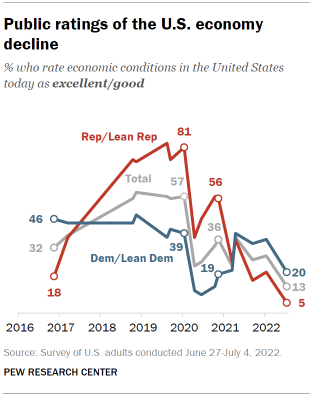
Americans' economic ratings have declined steeply since the beginning of the year: Just 13% now describe economic conditions as excellent (1%) or good (12%), down from 28% in January.
About four-in-ten (38%) describe economic conditions today as only fair, while 49% describe them as poor, roughly double the share who described the economy as poor six months ago (24%).
Current economic ratings are more negative than at any point in the last few years, and roughly on par with ratings a decade ago, when the nation was still emerging from the Great Recession (and at a point when the unemployment rate was more than twice what it is today, but inflation was substantially lower). ( Note: Because data on national economic ratings prior to 2017 was collected using telephone surveys, trends are not directly comparable due to a modest mode effect. See this 2020 report for more discussion and data on long-term trends in views of the national economy.)
Economic ratings have declined among both Republicans and Democrats over the past several months, though Democrats' views remain more positive than GOP views. In January, about a third of Democrats (36%) rated the economy as excellent or good. Today, one-in-five Democrats say this. And while 20% of Republicans rated the economy positively in January, only 5% say this today.
And while the share rating the economy as poor is up substantively since January, Republicans are far more likely than Democrats to say this. Today, two-thirds of Republicans (67%) say economic conditions are poor, compared with about a third of Democrats (32%).
Mixed economic expectations, but more negative than in the recent past
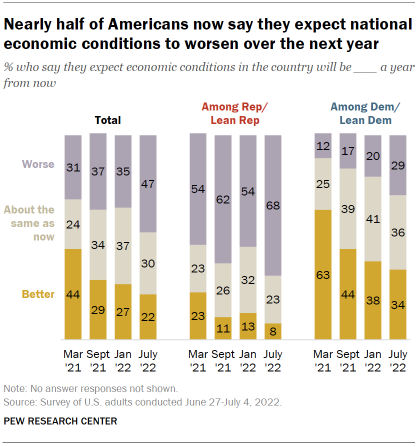
Americans are increasingly pessimistic about the future of the economy. About half (47%) say that they expect economic conditions in the country will be worse a year from now; in January, about a third (35%) said they expected conditions to worsen.
Today, three-in-ten say they expect economic conditions to be about the same a year from now, and 22% say they expect economic conditions to be better.
While Republicans have been pessimistic about the future of national economic conditions since the start of Biden's presidency, they are particularly negative today: 68% now say they think economic conditions will get worse over the coming year, the largest share saying this at any point since Biden took office. About a quarter of Republicans (23%) expect economic conditions to be about the same a year from now, while only 8% say they expect conditions to improve.
Views among Democrats are more mixed, though they have also turned more pessimistic than they have been at previous points over the last few years. Today, about a third (34%) say they expect the economy to be better than it now is in a year, while a similar share (36%) thinks it will be about the same. About three-in-ten (29%) say they expect conditions to worsen, although this is up from two-in-ten six months ago.
Personal financial ratings tick more negative, particularly among the GOP
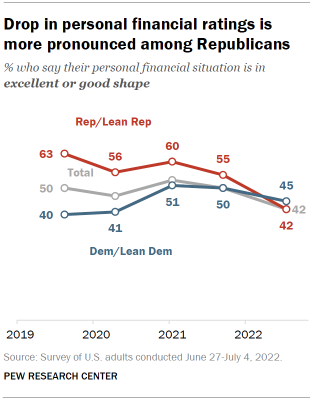
While personal financial ratings tend to be more stable than national economic assessments, the share of the public offering positive assessments of their own finances is lower than it has been in the last few years. In particular, Republicans' assessments of their own finances have declined over the last year.
Today, Democrats (45%) and Republicans (42%) are about equally likely to say their finances are in excellent or good shape.
However, Republicans' assessments of their personal finances are considerably less positive than they were in September 2021, when 55% said their finances were in either excellent or good shape.
By contrast, there has only been a more modest decline in the share of Democrats rating their personal finances as excellent or good. In September 2021, half of Democrats said this, compared with 45% today.
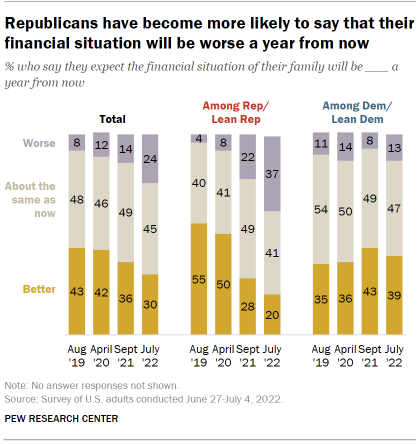
When asked for their expectations of their financial situation a year from now, 45% of Americans say they expect it to be about the same as it currently is. Three-in-ten say they expect their financial situation will be better a year from now, and about a quarter (24%) expect their situation to worsen.
The share of the public who expect their financial situation to worsen in the coming year (24%) is higher than it has been in recent years.
Much of this movement has come among Republicans: Today, 37% of Republicans say they expect their financial situation will be worse a year from now, compared with 22% in September 2021 and just 8% in April 2020.
About four-in-ten Republicans (41%) expect their financial situation to be about the same as it is now in a year, while 20% expect it will be better.
By contrast, only 13% of Democrats expect their financial situation to be worse a year from now, roughly similar to the shares who said this over the past three years.
Nearly half of Democrats (47%) expect their financial situation to remain about the same a year from now, and 39% say they expect their financial situation will be better a year from now.
Inflation tops the list of Americans' economic concerns
While large majorities of Americans say they are at least somewhat concerned about several aspects of the economy, rising prices of food and consumer goods - along with increases in the costs of gas and energy - are at the top of the public's list of concerns.
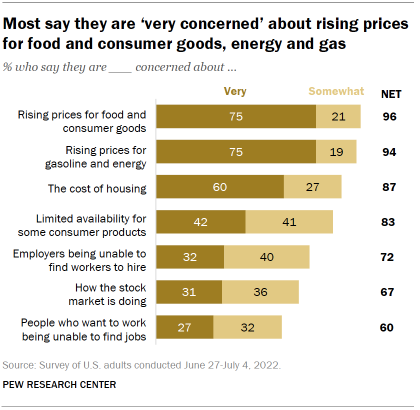
Nearly all Americans (96%) say they are at least somewhat concerned about rising prices for food and consumer goods: Three-quarters of Americans say they are very concerned about this. Last September, this also was a top concern for the public, though the share saying they are very concerned is now 12 percentage points higher than it was then.
Public concern about rising prices for gasoline and energy is nearly identical to concern about food and consumer prices: 94% say they are at least somewhat concerned about rising energy and gas prices, while 75% say they are very concerned about this.
The cost of housing also ranks high as a concern for the public: 87% say they are very (60%) or somewhat (27%) concerned about housing costs. The public expresses less concern about limited availability of some consumer products. Still, 42% say they are very concerned about this, while a nearly identical share say they are somewhat concerned (41%).
No more than about a third of Americans (32%) are very concerned about employers being unable to find workers, how the stock market is doing (31%) and people who want to work being unable to find jobs (27%).
The public is somewhat less concerned about employers being unable to find workers for hire than they were in September 2021 (32% now vs. 42% then).
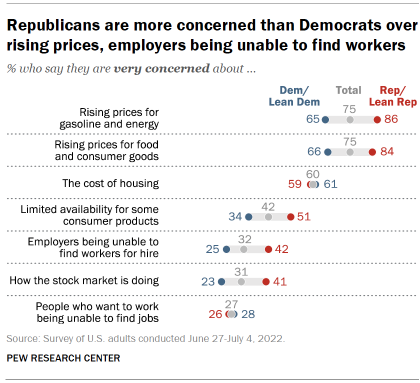
Economic concerns differ by party, with Republicans expressing more concern than Democrats on five of the seven issues in the survey.
While majorities in both parties say they are very concerned about rising prices for gasoline and energy and food and consumer goods, Republicans are about 20 percentage points more likely than Democrats to say they are very concerned about both of these issues.
Republicans also are more likely than Democrats to say they are very concerned about limited availability for some consumer products (51% vs. 34%), employers being unable to find workers for hire (42% vs. 25%) and how the stock market is doing (41% vs. 23%).
Republicans and Democrats are about equally likely to express concerns about the cost of housing (61% of Democrats, 59% of Republicans) and people who want to work being unable to find jobs (28% of Democrats, 26% of Republicans).
Public perceptions of reasons for inflation
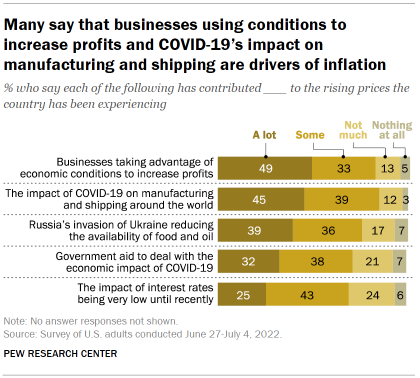
Most Americans see the rising prices the country has been experiencing as the result of several different factors. About half (49%) say that "businesses taking advantage of economic conditions to increase their profits" has contributed a lot to rising prices. One-third also say that this has contributed some, while about two in-ten say it has contributed either not much (13%) or nothing at all (5%).
More than four-in-ten (45%) say that "the impact of coronavirus on manufacturing and shipping around the world" has contributed a lot to rising prices, with 39% saying it has contributed some.
About four-in-ten adults (39%) say that "Russia's invasion of Ukraine reducing the availability of oil and food around the world" has contributed a lot to inflation.
Smaller shares of the public say that government aid to deal with the economic impact of COVID-19 (32%) and the impact of interest rates being very low until recently (25%) have contributed a lot to rising prices.
Majorities in both parties see each of these factors as contributing at least somewhat to the rising prices, but Republicans and Democrats differ over the extent to which each of these is a reason for the inflation the country has been experiencing.
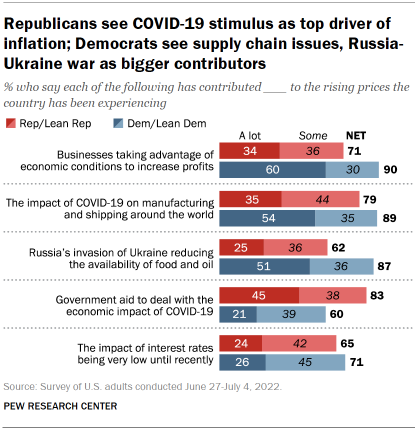
For example, nine-in-ten Democrats say that businesses taking advantage of economic conditions to increase profits has contributed at least some to rising prices, including 60% who say this has contributed a lot. Republicans are considerably less likely to say this has been a driver of inflation: 71% of Republicans say this has contributed at least some to rising prices, while 34% say it has contributed a lot.
A similar pattern is seen for both the global impact of COVID-19 on manufacturing and shipping and Russia's invasion of Ukraine reducing the availability of food and oil around the world. Democrats are more likely than Republicans to say that each of these has contributed substantially to rising prices.
The partisan gap is less pronounced over whether interest rates being very low has contributed at least some to rising prices: Democrats are somewhat more likely than Republicans to say this (71% vs. 65%), with only about a quarter in each party saying low interest rates have contributed a lot to rising prices.
More than these other factors, Republicans point to "government aid to people, businesses, and communities to deal with the economic impact of coronavirus" as having contributed a to rising prices. An overwhelming majority of Republicans (83%) say this has contributed at least some to rising prices, with 45% saying this has contributed a lot to the nation's current inflation. While six-in-ten Democrats say pandemic stimulus has contributed at least some, only about two-in-ten (21%) say it has contributed a lot.

